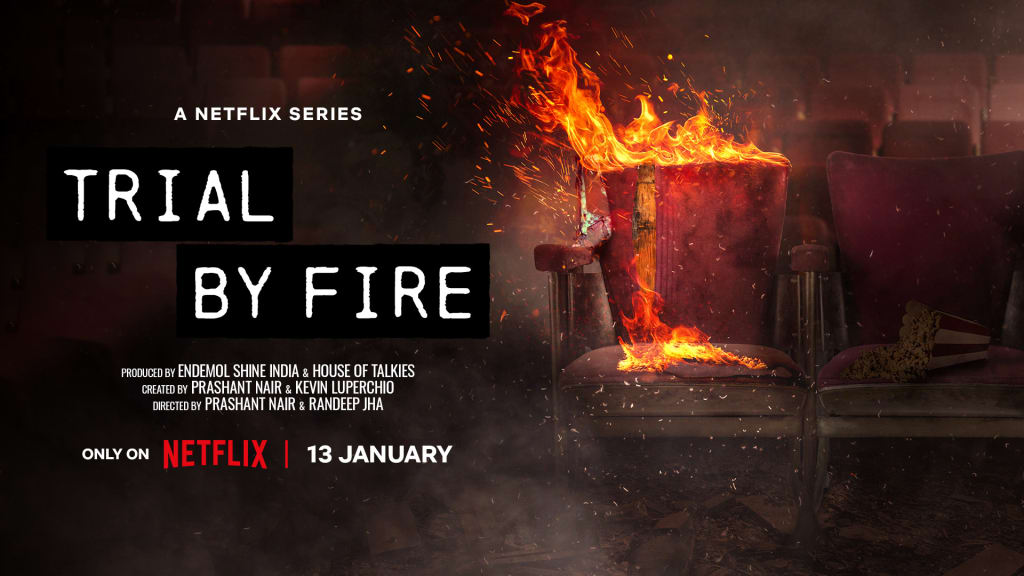‘Trial By Fire’ Netflix series review
Anatomy of a man-made disaster

On June 13, 1997, the Uphaar cinema hall in Delhi was the site of a devastating fire that claimed 59 lives. This tragedy also marked the end of an unspoken pact between movie theater patrons and management, that the audience would be safe while being transported to a world of cinema. Among the victims were Ujjwal and Unnati, the children of Shekhar and Neelam Krishnamoorthy, a hardworking urban couple trying to provide a bright future for their kids in the city.
As media reports indicated the disaster was caused by the theater management's careless attitude, the Krishnamoorthys decided to take on the Ansals, the owners of Uphaar, who refused to accept responsibility, by forming an association of the victims' families. Their tireless efforts to move the slow wheels of justice are depicted in the seven-part series Trial By Fire, directed by Prashant Nair and Randeep Jha. The series is based on the memoirs of Shekhar and Neelam and offers a poignant look at the fight for justice by the bereaved families and the smoky residue of conscience from a tragedy that rocked the nation.
The cinema hall, lacking proper public address and alarm systems, quickly turned into a crematorium. Its aftermath tarnished the reputations of both government and private entities, who prioritized their self-interest and image over public safety. Despite having significant resources, the management chose to deny responsibility and shift the blame to government agencies.
The series meticulously reveals the corrupt system in which the wealthy and influential can manipulate evidence, bribe witnesses, and prolong court proceedings. The filmmakers unflinchingly expose this ugly underbelly of the system, showing the delay in registering the FIR against the Ansals and the threats and bribes offered to the victims' families. The series conveys a sense of urgency in highlighting the slow pace of justice and its impact on the families, while also treating the subject matter with sensitivity and nuance.
The series opens with the image of a kitchen flame and delves into the heartache and inner turmoil of the protagonists as they navigate the aftermath of the disaster. Through moments of silence and introspection, the writers effectively convey the depth of emotion and how grief can change a person. The scene in which Neelam learns that Arjun, a friend of Ujjwal who was supposed to be at the movie theater, survived the tragedy by chance, highlights the bitterness and pain that can be elicited by even the most seemingly innocuous events. This series is not just gut-wrenching and heart-rending, but a powerful reminder of the impact of tragedy and the importance of justice.
This seven-part series, drawn from Shekhar and Neelam's memoir, "Trial By Fire," depicts the journey of the Krishnamoorthys as they took on the Ansals and fought for justice for their children and the other victims of the Uphaar tragedy. Directed by Prashant Nair and Randeep Jha, the series provides a close examination of the struggle for rights by the bereaved parents and the impact of the disaster that stunned the nation.
The series is not just an exploration of the legal battle, but also a look at the emotional toll it takes on the families. Through moments of silence and subtle hints, the series shows how grief transforms individuals and the lengths they are willing to go to seek justice. The audience is taken on a journey through the various challenges and obstacles faced by the Krishnamoorthys as they attempt to hold the Ansals accountable for their actions.
At the heart of the series is the uncovering of the corrupt system that allows the rich and powerful to manipulate evidence, bribe witnesses, and delay court proceedings. The series does not shy away from exposing the dark side of the system and the many ways in which the Ansals tried to dodge responsibility for the tragedy.
This series is not just a gut-wrenching and heart-rending depiction of the tragedy, but also a powerful reminder of the impact that grief can have on a person and the importance of holding those responsible accountable. Through its depiction of the Uphaar tragedy, "Trial By Fire" brings attention to the need for accountability and the importance of fighting for justice, no matter how difficult the journey may be.
The memory of their loss and work tirelessly to seek justice for their children and the other victims. Despite facing numerous obstacles, including threats and corruption, the Krishnamoorthys refuse to give up and their unwavering determination is the driving force behind the series.
"Trial By Fire" is a powerful story that sheds light on the corruption and greed that led to this tragic event and the bravery of those who fought against it. The filmmakers approach the subject matter with sensitivity, providing a nuanced and compelling look at the impact of the disaster on the families affected and society as a whole. Through their journey, the series delivers a haunting reminder of the importance of accountability and the fight for justice.
In conclusion, this seven-episode series is a gripping, thought-provoking tale of courage, resilience, and the struggle for justice in the face of overwhelming odds. The impactful and moving story of the Uphaar tragedy is brought to life through the efforts of the Krishnamoorthys, who bravely stand up against corruption and the powerful forces that seek to cover up the truth. "Trial By Fire" is a must-watch for anyone interested in a sobering look at the realities of the Indian justice system and the fight for accountability and justice.





Comments
There are no comments for this story
Be the first to respond and start the conversation.